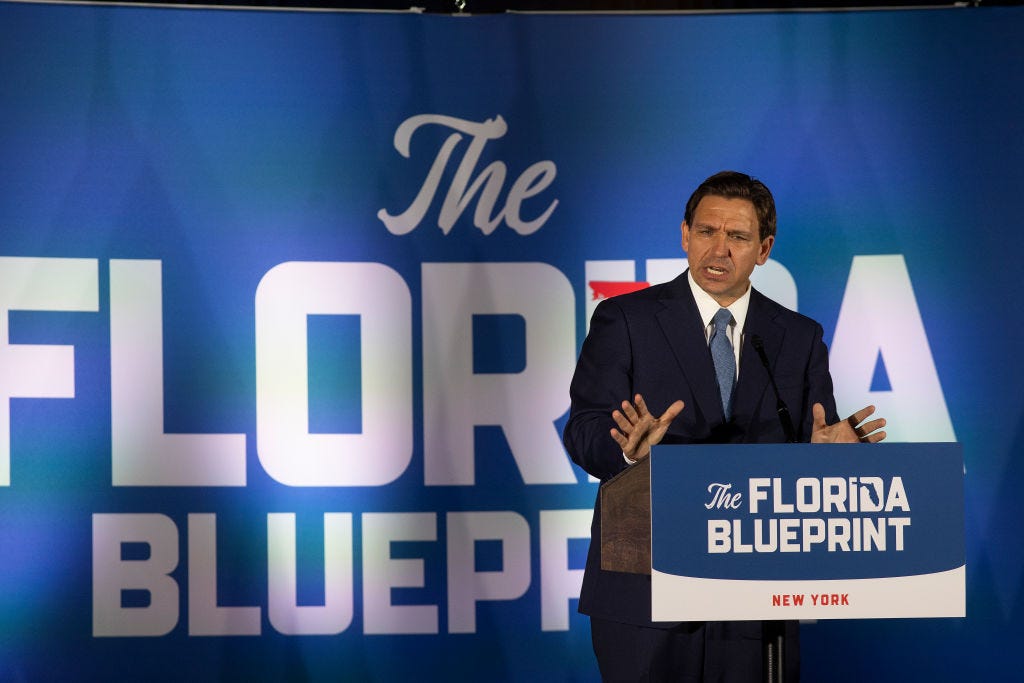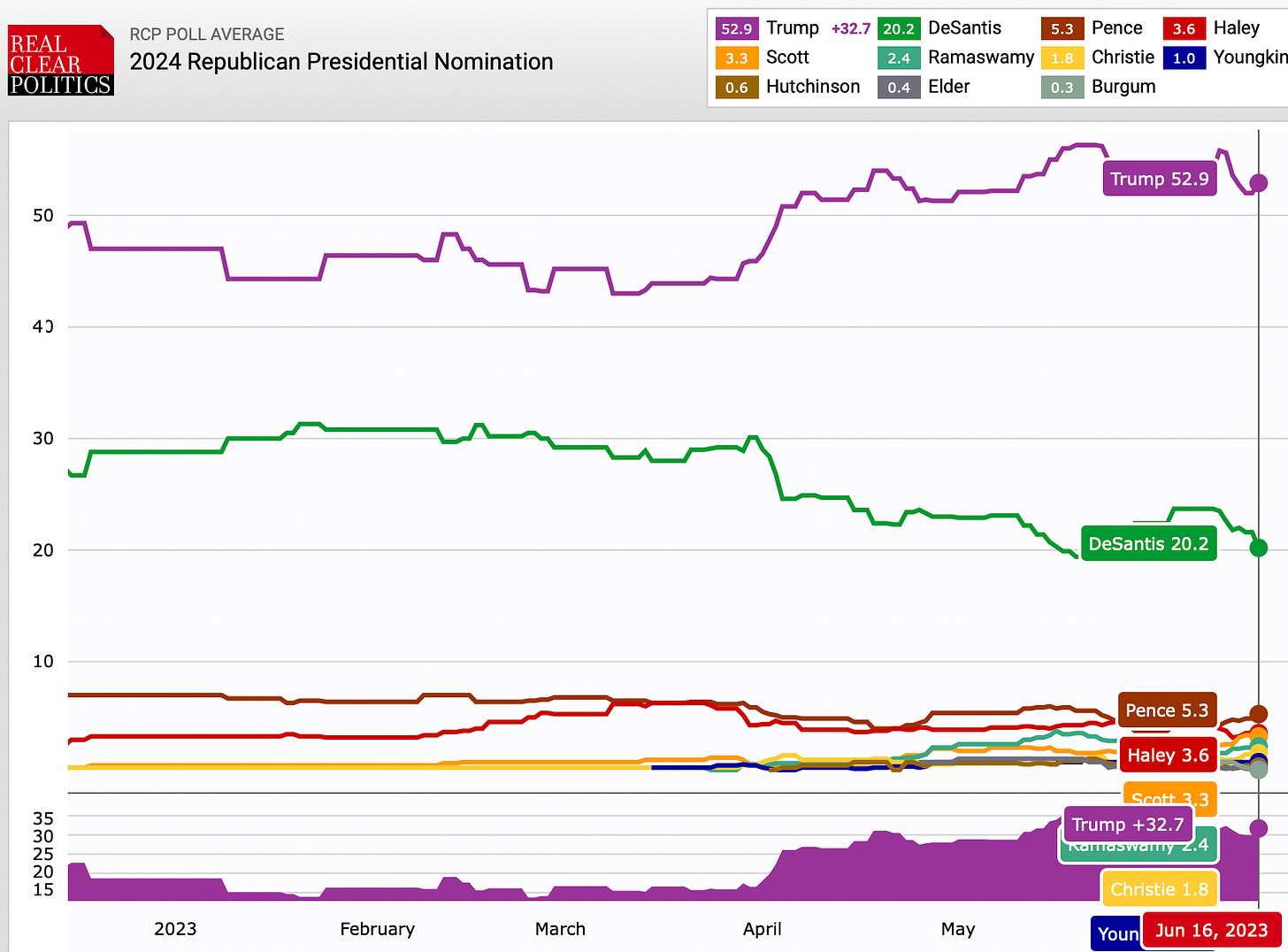Why Has Gov. Ron DeSantis Failed to Gain Steam So Far?
Culture wars alone won't cut it. He needs a sharper economic focus to differentiate himself from Trump and other contenders.

Florida Gov. Ron DeSantis’s best polling in the presidential cycle to date was registered months before he officially entered the race on May 24, 2023. Early this year, DeSantis was polling just above 30 percent with Trump held to under 50 percent, according to the RealClearPolitics running average. Since March, however, DeSantis’s support has fallen into the mid-to-low 20s and currently sits at 20.2 percent—about where he started on the day he announced his candidacy.
What gives?
Gov. DeSantis was heralded as the man most likely to defeat former president Trump in a possible head-to-head. He has a governing record in Florida that conservatives nationally like and see as a model for much of their desired policy efforts—particularly on culture war issues around schools and “anti-wokeness”. He’s young, has a nice family, and a solid personal biography including a stint in the Navy.
But none of this seems to have mattered so far as DeSantis has emerged rather flat footed.
His campaign launch on Elon Musk’s “Twitter Spaces” was a technical disaster that was widely mocked. More importantly, and not his fault, the terrain in the GOP primaries shifted precipitously against him with the two different indictments against Trump—one related to his personal behavior in New York and the other related to his improper handling of sensitive national security documents after he left office.
Given the reticence of DeSantis and most other GOP contenders to say anything critical about the former president’s behavior, it’s not surprising that Trump’s various legal follies have strengthened his position among diehard Republican voters as people line up to defend him from perceived political attacks. Notably, the day after 37 felony counts were unveiled against Trump in a federal court, his support hit a near-record high level of 56 percent.
It's not a given that these legal cases against Trump, particularly the serious federal charges of mishandling state secrets and refusing to return government documents, will fail to put a dent in Trump’s support over the next 6 months or so. After all, GOP voters desperately want to defeat President Biden and primary voters could make the rational decision to back another horse in the race given Trump's myriad deficiencies with the truth and his clear inability to amass greater national and battleground state support.
To capitalize on this potential shift in GOP sentiment, DeSantis first needs to make a more compelling argument against the other contenders seeking to take on Trump (or auditioning for the vice presidency, take your pick). For example, DeSantis doesn’t seem any better than Nikki Haley or Tim Scott in pressing the case against Trump despite his higher numbers, while Vivek Ramaswamy clearly knows how to command “anti-woke” media attention from his position in the single digits. DeSantis has his work cut out for him to sharpen his profile among base GOP voters—and in relation to other candidates—before moving on to Trump.
Second, DeSantis needs to make a clearer, more concise, and more unified case against Donald Trump—and for his own candidacy. If you want culture wars, Trump has them in droves. If you want grievance and victimhood, Trump oozes self-pity that few people can top. He reminds GOP voters non-stop about the “deep state” and “globalist elites” and the “liberal media” out to get him—and by extension them. And Trump has a running playlist of his past policy promises that he mostly failed to deliver on, like immigration and taking on China, that still raise the spirits of primary voters.
In contrast, DeSantis supporters obliquely argue that their guy is more competent at culture wars, upending entrenched bureaucracy, squelching the media, and dealing with illegal immigration. But there’s little evidence that competence is a winning theme among Republican voters who regularly value Trump’s performances over governing.
The economy is the wild card. No one in the race has yet articulated a serious or comprehensible vision of what they would do differently than Joe Biden on the economy other than to stop spending. This is a huge blind spot for everyone in the race. Despite preconceived notions about primary voters, Republicans themselves express a far greater interest in candidates who have a plan to lower inflation and cut taxes rather than ones committed to waging more culture war fights on abortion or limiting transgender rights, according to recent CBS News polling.
If DeSantis can’t beat Trump on culture, he could certainly offer a compelling contrast on economic stewardship. Florida after all has had a great run of job creation and population growth over the past few years that many Republicans, as well as other independents, surely respect. He could bolster this record by developing and presenting a more forceful and fleshed out pro-small business, pro-working class, pro-family, and anti-regulation agenda that many primary voters would appreciate and support. The interesting, non-traditional policy ideas recently put forth by American Compass would be a good place to start for an ambitious conservative.
The GOP nominating contest remains fluid this far out. But something must shift—rather sharply—over the next few months to get more Republican voters to give DeSantis a serious second look, particularly among white working-class voters who make up Trump’s core support.
If going after Trump on his personal failings and political liabilities doesn’t work—and culture wars alone won’t cut it—perhaps DeSantis needs to read up on James Carville’s eternal wisdom for all political challengers: “It’s the economy, stupid.”





